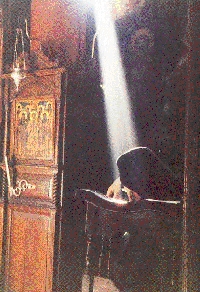
All-Male Monastic State Defends Ban on Female Visitors -- by George Gilson *** The all-male monastic community of Mount Athos is up in arms over a European Parliament report requesting that the self-governing state lift a nearly 1,000-year-old ban on the entry of women to the peninsula they occupy in Halkidiki, northeastern Greece. “It is very unjust for our country to be accused of preserving the special status of Mount Athos. Instead, [Greece] should be praised, because this is what is mandated by international treaties, the Greek constitution and laws and the Common Statement on Mount Athos at the time of Greece’s Treaty of Accession to the European Economic Community in 1979,” reads a statement issued on January 16 by the Iera Epistasia, the autonomous governing council on which the 20 major Athonite monasteries are all represented.
The statement was a sharp rejection of the call to lift the ban on females in the “Report on the Human Rights Situation in the European Union,” issued on December 12. The report “requests the lifting of the ban on women entering Mount Athos in Greece, a geographical area of 400 square kilometres, where women’s access is prohibited in accordance with a decision taken in 1045 by monks living in the 20 monasteries in the area, a decision which nowadays violates the universally recognised principle of gender equality, Community non-discrimination and equality legislation and the provisions relating to free movement of persons within the EU.” Speaking before the European Parliament on January 20, Culture Minister Evangelos Venizelos strongly defended the special status of Athos—including the prohibition of female visitors—citing guarantees offered by Greece’s treaty of accession to the EEC and the Treaty of Amsterdam, as well as the Greek constitution. European Parliament deputy Anna Karamanou—who is a member of the socialist parliamentary group (just as Dutch Euro-MP Joke Swiebel, who drafted the report)—was the only Pasok deputy who voted in favour of lifting the ban on female visitors to Athos.
“This is an issue of underrating the female gender and the marginalisation of women. They don’t have the right to do this in an entire region where such things as old manuscripts and a cultural legacy are preserved. Cultural heritage belongs to everyone,” Karamanou said. Asked why the monasteries should not be able to dispose of their property as they see fit, the Euro-deputy replied: “They belong to the monasteries. But how do the monasteries allow this? Is thee a moral basis to a decision that one gender of the human race is allowed to enter and the other not to? Can the male exist without the female and the female without the male? The human race is one. Women are humans and as such they must have exactly the same rights—not more.” Karamanou denied that the special status of Athos—agreed to by Athens’ EU partners when Greece was admitted to the EEC—legitimises the age-old ban on the entry of females. “The exemption must cover autonomy and self-administration, which does not offend women or their human rights. I’m not opposed to that. But I don’t think that this exemption implies a distinction based on gender,” she said. “I’m criticising what I see as a hatred against women by the monks of Mount Athos. Will the monks be scandalised if women go? Is that what you are implying?” she added. “It’s not legally binding. But it is, nonetheless, the view of the European Parliament. The decision must be taken by the Athonite monks themselves if there is sensitivity,” Karamanou said, noting that other female Euro-deputies had raised the issue about five years ago.
|
Back to Hellenic Headline News
|

